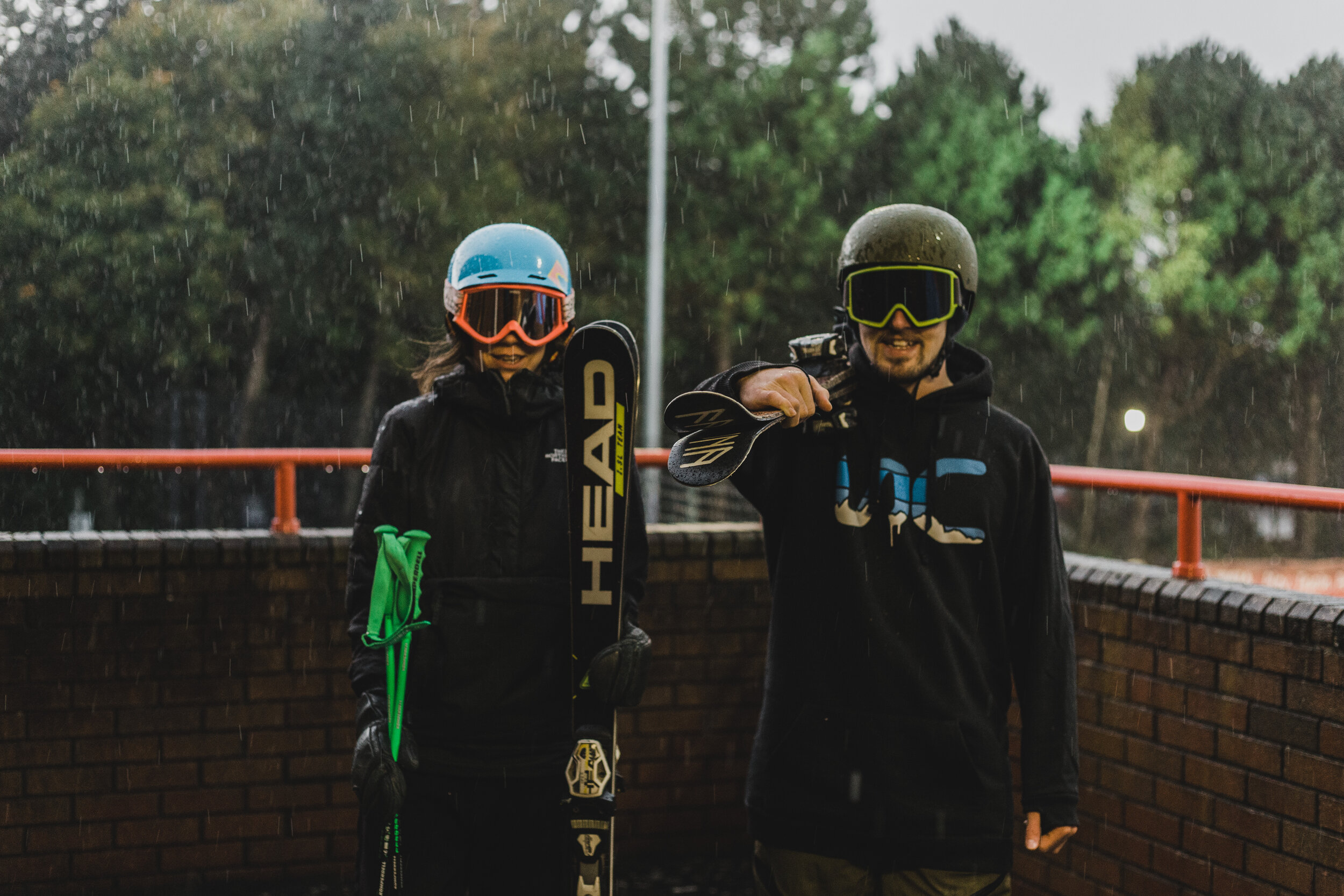Concussion in Snowsports - A student athlete experience
By Fraser Menzies (@_frasermenzies), December 1st, 2020
Pictured (left to right): Hannah Gray, Fraser Menzies.
Early Experiences
I experienced my first concussion at the age of 16. I was at Cairngorm in the Scottish Highlands, the weather was horrible, with strong winds and poor visibility - and ultimately I crashed whilst performing a freestyle skiing trick. I briefly lost consciousness and was rather disorientated when I came around. I don’t actually have any first hand memories of this; rather, this is what I was told by my friends who helped me out at the time.
This story quite neatly fits the “stereotype” concussion: clear impact trauma, loss of consciousness, and immediate subsequent confusion and disorientation. This made it quite obvious to spot, and I was seen at A&E for a check-up. I was off school for several days whilst my symptoms settled, and my recovery was generally very straightforward. Thankfully, early recognition of the concussion and appropriate support from teachers led to a positive outcome in the recovery.
But what about those situations where it’s harder to recognise the initial concussive event? Or when symptom onset is delayed? In some cases, it can take 24-48+ hours for symptoms to manifest, which is particularly problematic given that early intervention is important.
Concussions at University
Whilst at university I’ve been heavily involved with the Snowsports club. My discipline, freestyle skiing, involves performing tricks on kickers (jumps) and rails. The nature of the sport involves a degree of trial and error, and therefore it’s not uncommon to have falls in training or competition.
Most of the time, you’ll bounce back up, dust yourself off, and come away unscathed. However, sometimes you can sustain injuries. Muscle strains or fractures tend to be obvious pretty quickly, but a concussion might be more subtle and take longer to become apparent.
In October 2018 I had a crash during an evening training session in Glasgow. Initially I thought nothing of it - it was only when travelling home after the session that I began to feel unwell. We stopped at a service station to grab some food, and I remember being very sensitive to the light on the menu board. The light sensitivity became more apparent when I started struggling to even look at my phone screen. Soon after this was accompanied by headaches and a general “hazy” feeling. It was at this point that I recognised, I was most likely concussed.
The next morning, I was able to arrange an assessment with FASIC, the sports medicine clinic at my university. They have a great deal of experience in concussion management, and were able to offer me detailed advice to support my recovery. The key aspect: an initial period of complete rest, physically and mentally, followed by a graduated return to play protocol.
Participating in the Snowsport Scotland Dryslope Championships in November 2016. Image credit: Neil MacGrain Photography
The Support I Received from Academic Staff
As a student, you’re required to be performing at a high level mentally, and any disruption to this could influence your grading. My concussion happened at a particularly stressful time: my dissertation proposal was due two days later, and I had a large volume of coursework to keep up with anyway. Unable to tolerate screen time, I instead visited my dissertation supervisor in person (luckily only a couple of minutes away from the sports medicine clinic). I explained that I had sustained a concussion, was experiencing fairly debilitating symptoms, and was concerned about getting my proposal completed on time.
Based on my situation, and formal concussion diagnosis, my supervisor was completely supportive - they recognised that I needed to rest, and to reduce potential stressors. They advised me to head home, and assured me that they would take care of arranging an extension. Lectures for my courses were all being recorded, and I could catch up on these at a later date once I had recovered.
This support undoubtedly played a big role in my recovery. When suffering from a concussion, your mental performance can be limited in a number of ways: impaired processing, decreased attention span and trouble remembering. If I had tried to “work through it”, it would have also likely prolonged/worsened the concussion, and resulted in a sub-optimal assignment.
I’m also prone to suffering from poor mental health, which usually manifests itself in depression or anxiety. There is some evidence to suggest that this is associated with longer recovery times from concussion. In my case, I believe that if I hadn’t had the full support of academic staff, I would have been trying to fight off a concussion (making symptoms worse in the process) whilst facing increased anxiety about my academic performance (which would be declining due to worsening concussion symptoms) - and it’s pretty clear to see that could have become a vicious cycle.
In Practice
The guidance around concussion from national bodies (such as Scottish Sports Concussion Guidance from Sportscotland) is clear that early intervention, and complete cognitive and physical rest is vital in the first 24-48 hours of a concussion. I believe that when students sustain a diagnosed concussion, academic staff should support them by offering as much flexibility as possible, such as through coursework extensions or catching up on content after symptoms have cleared.
Having that immediate support has a massive role in short-term recovery (and may help avoid prolonging the overall duration of concussion symptoms), but also makes sure that students aren’t disadvantaged or excessively stressed whilst recovering from what is already a complex and challenging injury.
I was very lucky to receive such great support from my tutors, and urge anyone who finds themselves in a similar unfortunate position to seek similar support!


